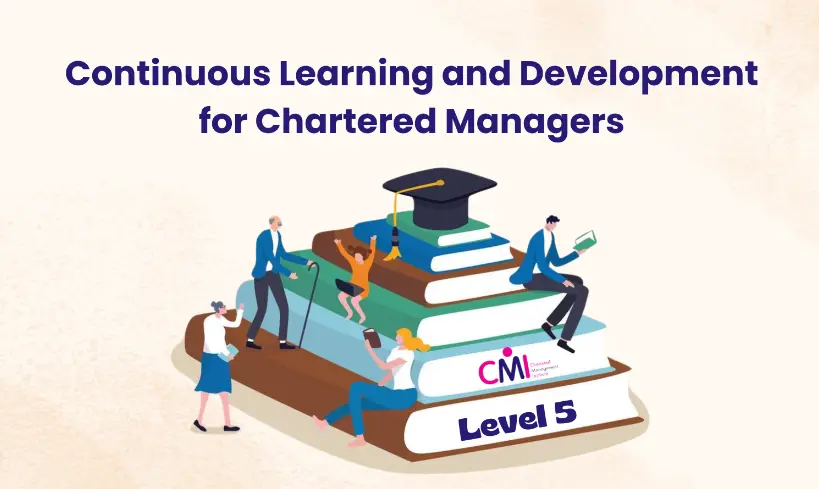For management professionals, the quest for knowledge never ends as the corporate world keeps growing at an explosive pace. This poses an interesting question: What is a Chartered Manager, and how can they stay ahead in today’s corporate scene? Participating in CMI Level 5 Courses is a major step they can take towards maintaining their relevancy and improving their managerial competencies.
The Vital Role of Continuous Learning
Chartered managers are known for their capacity to lead others and properly handle change. Maintaining this level, though, is not a one-time achievement; it calls for a dedication to ongoing education and development. This strategy not only keeps managers sharp but also strong and flexible enough to handle new innovations and challenges.
Benefits of Continuous Learning
Beyond merely keeping updated with business trends, ongoing education has many benefits that greatly improve managerial effectiveness. The following describes how:
Remaining Relevant in a Changing Market
In a world where new technology and approaches may transform sectors overnight, staying updated is absolutely vital. Constant learning guarantees that chartered managers can apply the most recent concepts and strategies to their work, therefore maintaining the competitiveness of their companies.
Improving Leadership Skills
One cannot characterize leadership as static. A leader’s abilities must evolve with teams and companies. Ongoing education gives managers fresh ideas and approaches for inspiring and guiding varied teams.
Possibilities for Career Advancement
For many professionals, continuous learning opens doors to new opportunities. Chartered managers who show initiative in their growth will be positioned for more senior positions either in their present company or in new ones.
The Impact of CMI Level 5 Courses
Completing the Chartered Management Institute (CMI) Level 5 courses is a calculated move that lets managers improve their skills and expand their knowledge base. These courses focus on relevant subjects like project management, leadership, and organizational strategy, thereby offering a strong platform for good management techniques.
Choosing the Right Learning Path
A manager’s road to development depends largely on the courses or programs they choose. One must evaluate both personal and professional objectives and match them with the offerings of various educational programs. Whether it’s formal qualifications, short courses, or online workshops, the secret is to choose courses that will improve one’s managerial skills.
Blending Formal Education with Practical Experience
Although formal education is quite valuable, practical application is just as important. Chartered managers should look for chances to implement what they study in their courses in their workplace. This could mean supervising new projects, implementing innovative concepts, or mentoring junior managers.
Embracing Technology in Learning
The digital era has changed education so much that learning is more easily accessible. Online resources, virtual seminars, and digital tools let chartered managers support their learning process. Apart from their convenience, these technologies provide a wealth of new information that could be essential for rapid learning.
Building a Culture of Learning
Encouraging a learning culture inside the company is one of the most impactful steps a chartered manager can take. Managers can motivate their staff to follow their own learning paths by supporting ongoing development and demonstrating its worth via their actions.
Nurturing a Network of Professionals
Any chartered manager should build and preserve a professional network. Networking makes sharing expertise and learning from colleagues in other sectors possible. Regularly attending management-related conferences, seminars, and online discussion boards would help managers deepen their knowledge and expose them to several management approaches and ideas. This participation improves learning by allowing one to discuss difficulties and solutions in real-time.
Feedback as a Tool for Growth
Good managers know the value of constructive criticism—not only providing it but also receiving it. Establishing channels for feedback inside their teams helps chartered managers better understand where their leadership is strong and where it needs improvement. Personal and professional development depends on this continuous feedback loop as it enables managers to adjust their methods and policies in line with the demands of their team and organizational objectives.
Prioritising Personal Development
Although professional skills are absolutely vital, a manager’s growth is also dependent greatly on personal development. Sustainable success depends heavily on areas including work-life balance, stress management, and emotional intelligence. Investing time in improving these soft skills will help chartered managers enhance their general wellness while strengthening their capacity for decision-making, therefore enabling them to lead successfully under various circumstances.
Leveraging Mentorship Opportunities
Another very effective element of lifelong learning is mentorship. Being both a mentor and a mentee will give chartered managers valuable insights and learning opportunities. While serving as a mentor allows one to reinforce their knowledge and skills, interacting with a mentor who has negotiated similar challenges can provide direction and support. This reciprocal relationship enhances leadership skills inside the company and encourages personal development.
Conclusion
Lifelong learning is not just a professional need for chartered managers but also a strategic one that propels personal development, creativity, and long-term success. Completing CMI Level 5 courses and prioritizing continuous development are key tactics that help managers maintain their competitive edge and lead their teams with confidence and understanding. Remember, a leader’s competencies should always change along with the changing terrain of management.
